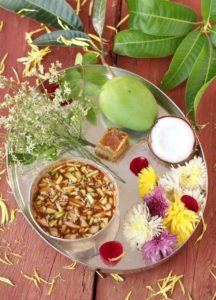This is the day
- Creator God Brahma started his work in Satya Yug
- Vishnu’s Avatar Sri Ramachandra was coronated in Thretha Yug
- Dharma Putra (Yudhishthir), Paragon of Virtue, ascended the throne in Dwapara Yug after winning Mahabharatha war
- Maharaja Vikramaditya defeated the shakas (said to be the clans from present day Iran-Turkey) and established an expansive kingdom

Yes, these specials occurred on the opening day of the New Year called Ugadi / Yugadi. These are known to Bharatiyas. In addition, what is even more refreshing for the Sanga Swayamsevaks is the fact that Yugadi is the birthday (1 – 4 – 1889) of Dr. Kesava Baliram Hedgewar, founder of Rashtriya Swayamsevak Sangh.
Bharat is an ancient and vast country. The country has seen many noble and valarous kings. Therefore, it is natural for us to have many calendars. Among them, Vikrama Samvatsara and Saka Samvastra are widely adopted.
Chaandramana (lunar)
Vikrama samvat Annual Calendar is based on the movement of the moon. 57 years before the beginning of the general year, i.e. this year Vikrama year is 2078. On this basis, the first day of waxing in the month of Chittirai is the day celebrated as Yugadi which is the beginning of the New Year. Maana means to measure or calculate. According to this calendar, a typical year is made of 354 days. In present times, Yugadi is celebrated in many northern states of our country and in the south in Andhra Pradesh, Telangana, Karnataka, Maharashtra including Konkan region.
Suryamaana (solar)
The Saka calendar begins in the year 78 common era. This Saka year is 1943, and this calendar is based on the movement of the Sun. It has 365 days a year. Though it is generally known as Tamil New Year, it is celebrated with same fervour in many parts of our country like Kerala, Assam, Punjab, some parts of Gujarat.
Soul One Forms Many
We call the New Year by many names. For example, Vishu in Kerala, Yugadi in Andhra-Karnataka, Kudipadwa in Maharashtra and Bihu in Assam. However, the basic principles and objectives are the same. We can go on and on stacking up many proofs of unity in diversity.
It is our tradition to get up at dawn on New Year, take a bath, worship the elders, wear new dresses received at the hands of the elders, perform pujas and rituals at home, go to the temple and pray for divine grace, and welcome the days with fresh hope.
Neem flower pachadi
Neem flower with its fragrance welcomes the Vasant ritu and the New Year. Hence new year feast is an essential part of festivities in all parts of the country. Pachadi, a concoction of Neem flower, a little tamarind and mango are popular all over the country. It is customary to sip one or two teaspoons of the recipe. This mixture has elements tasting sweet, bitter, sour and, acerbic. It improves digestion and prepares us for the oncoming summer season. It silently indicates and prepares us to accept the happenings, pleasure or pain, as they are.
Everything is enjoyable
Yet another delicacy of New Year is Poli made of coconut and lentils. This sweet is called Puran Poli in Marathi and Holige in Kannada. Brothers, get ready to eat this mouth-watering dessert this Yugadi day.
As part of welcoming the coming year, we witness large size Kolams all over Kerala and Andhra Pradesh (including Rangoli in the northern states), Kavi Sammelan (Poets’ meet) Music concerts, and Dance performances such as Punjab’s Bangra all evidencing rich and diverse forms of Bharatiya arts.
Not mere neighbours
State borders are all artificial lines drawn by mortals subject to political change! Look, although Yugadi is mostly customary in Karnataka, at the Kollur Mookambika Temple it is celebrated according to the solar calendar a la Tamil Nadu.
Similarly, the Thirumalaiswamy Perumal Temple, also known as the Bhagavan Temple, Dharapuram in Tirupur district of Tamil Nadu, is visited by a large number of Telugu-Kannada speaking Bharatiyas on the day of Yugadi. These are but two examples to disprove the claims of some sectarian politicians who tried shift the Tamil New Year day to the first day of Thai month (equivalent of Makara month). Tamilnadu, of course, rejected this move.
Double Dhamaka
This year, Yugadi and the Tamil New Year are happily occurring on two consecutive days. Is it not the fitting occasion to sink differences and welcome the new year unitedly with new hopes to conquer all challenges and to establish Bharat as the Viswa Guru?

